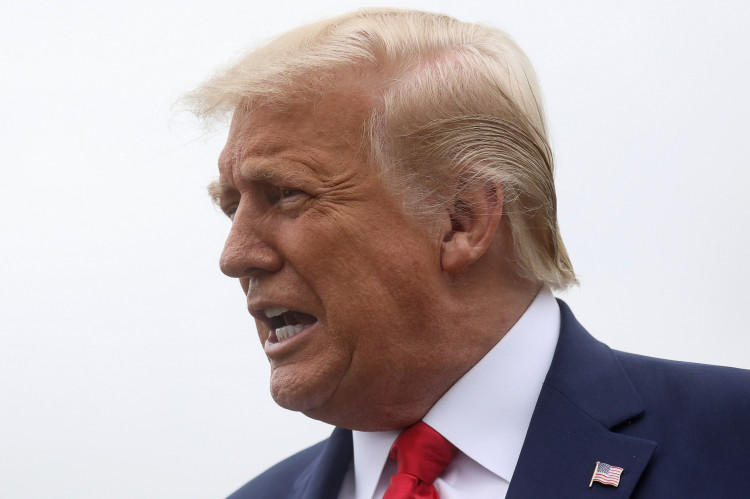U.S. President Donald Trump has once again advocated for a controversial plan to relocate Palestinians from Gaza, suggesting that large numbers of them should move to Egypt or Jordan. Despite fierce opposition from Palestinian leadership, regional allies, and the United Nations, Trump has reiterated his position, framing the move as a potential solution to the ongoing violence and instability in Gaza.
Speaking to reporters aboard Air Force One on Monday night, Trump was asked about his comments over the weekend, in which he described Gaza as a "demolition site" after more than 15 months of conflict. He reiterated his view that Palestinians could benefit from being relocated to neighboring countries where they could "live without disruption and revolution and violence so much." "When you look at the Gaza Strip, it's been hell for so many years," Trump stated. "There have been various civilizations on that strip. It didn't start here. It started thousands of years before, and there's always been violence associated with it."
Trump's comments come as the Gaza Strip continues to recover from a devastating conflict that has left much of its infrastructure in ruins. The war has killed tens of thousands of people, displaced millions, and further deepened the humanitarian crisis. With around 2.3 million people living in Gaza, many Palestinians have expressed skepticism about the notion of relocation, fearing that such moves would become permanent. Critics have pointed to the long history of forced displacements since the creation of Israel in 1948, which has left many Palestinians wary of the idea of temporary resettlement.
The proposal has also drawn sharp condemnation from Arab leaders. Both Egyptian President Abdel-Fattah el-Sisi and Jordanian King Abdullah have rejected the idea, emphasizing that Palestinians should remain in Gaza and that the issue must be addressed through a political solution, not forced migration. Sissi's "response [was] that he'd like to see peace in the Middle East," Trump said, referring to a conversation with the Egyptian leader. "I think he would do it, and I think the king of Jordan would do it too," Trump continued, despite both leaders' firm opposition to the plan.
The suggestion has been met with widespread disapproval from Palestinian authorities and across the Arab world. They fear that such a proposal would lead to the permanent displacement of Palestinians and further undermine the prospects for a two-state solution. Egyptian officials echoed these sentiments, warning that any such move could exacerbate tensions in the region.
In Israel, however, Trump's remarks have found support among the country's far-right factions, who have long advocated for the expulsion of Palestinians from Gaza. Some of these voices have called for the "voluntary migration" of Palestinians as a way to reduce civilian casualties during the ongoing conflict. Trump's suggestion also aligns with the views of Israeli Finance Minister Bezalel Smotrich and Itamar Ben Gvir, both of whom have expressed support for resettling Palestinians outside Gaza.
Trump's statement on relocating Palestinians has also sparked speculation about the political motivations behind his comments. Some analysts suggest that the U.S. president's remarks may be partly designed to shore up support from Israeli right-wing allies, particularly as Israeli Prime Minister Benjamin Netanyahu faces growing pressure from his coalition partners. "Trump's statements on resettling Palestinians may have been partially designed to help Netanyahu hang on to support from far-right allies who have destabilized his coalition," a member of Israel's security cabinet was quoted as saying.
In the United States, the proposal has not been universally embraced. Republican Senator Lindsey Graham, a close ally of Trump, expressed doubts about the feasibility of the plan, telling CNN that he did not see how it could be practically implemented. "The idea that all the Palestinians are going to leave and go somewhere else, I don't see that to be overly practical," Graham remarked. "What is their plan for the Palestinians? Do they want them all to leave?"
Meanwhile, Palestinian leaders continue to call for a comprehensive resolution to the Israeli-Palestinian conflict, with a focus on a two-state solution that would allow Palestinians to establish an independent state within the borders of pre-1967 Israel. The idea of relocating Palestinians outside Gaza is seen as a non-starter by many in the region, who view it as an attempt to sidestep the central issue of Palestinian self-determination.





